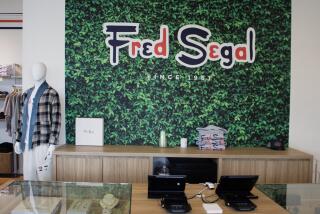Guitar Center Officials Not Fretting Over Strategy Shift
- Share via
AGOURA HILLS — A string of bad news has hammered Guitar Center Inc. on Wall Street lately, even as some analysts and company officials insist their music superstore concept is more than just a passing tune.
The first of the recent bad news came in late April, when word got out that the Agoura Hills-based seller of musical instruments would no longer distribute for Gibson Musical Instruments, a name practically synonymous with electric guitars.
That news was followed by an early June announcement that the company’s second-quarter earnings would fall 8 cents short of forecasts because of slow sales and its recent purchase of music retailer and catalog seller Musician’s Friend.
Company officials warned that same-store sales growth would slow down as well, from an unusually high annual rate of more than 12% in 1997 and 1998 to a more realistic level of 7% to 10% for the foreseeable future.
The streak of negative news dampened enthusiasm for the company’s stock, which has dropped from a 52-week high of $33.25 last July to levels near its current 52-week low in the $9-$10 range. It closed Monday at $10.81, up 38 cents.
The outlook for Guitar Center, which recently opened its 62nd store near St. Louis, is decidedly mixed depending on who’s writing the score.
On the one hand, upbeat analysts and company executives say the Gibson loss will have minimal impact, and annual same-store sales growth of even 5% to 7% would be enviable for any major retailer.
But singers of doom say competition is growing in the sector, which they say is ill-suited for the superstore concept anyhow because musical instrument buyers tend to make purchases less frequently.
Guitar Center co-Chief Executive Larry Thomas acknowledged that competition is taking a toll on the company, which was virtually unchallenged when it launched its national chain concept several years ago.
Since that time, Sam Ash Music and MARS Music have entered the fray, and Guitar Center has shifted its strategy somewhat from developing new markets to filling in areas where it already has stores, Thomas said.
That shift in strategy, as expected, has caused some new Guitar Centers to cannibalize similar businesses nearby, said Dean Ramos, an analyst at George K. Baum.
Still, the drop in same-store sales growth should not be too alarming, he said.
“You never liked to see a downward trend in comparable-store sales growth,” he said. “But I think it’s perfectly reasonable to have an expectation of between 5 and 7 percent [in same-store sales growth]. This company did themselves a little bit of disservice by showing such big comps for so long. They set the bar very high. The fact is there’s more competition in the business now, and parts of the business have been weaker.”
The loss of Gibson also was not the best news for a company that got its start in Hollywood more than three decades years ago selling organs before switching to its Guitar Center format, said Tom Kelleher, an analyst at B. Riley & Co.
“Obviously if your company is called the Guitar Center and one of the leading manufacturers no longer wants to distribute with you, that doesn’t sound good,” Kelleher said. “But financially, I don’t think [the loss] is as big as the image.”
Thomas insisted that prestige aside, the impact of the Gibson loss is not as great as some might think.
He explained that Gibson used its electric guitar prestige to force its other lesser-known products, such as Slingerland drums and Tobias basses, on retailers.
“They were using their Gibson to leverage their other brands,” Thomas said. “Gibson itself was a very slow-turning line, but it made sense to have the line because of the brand name. But when you started leveraging all the other product lines, it didn’t make sense.”
While Guitar Center did not reach a distribution agreement with Gibson, its two main competitors--Sam Ash and MARS--did.
Still, Thomas said it won’t be a crushing blow--noting that sales of Gibson products accounted for about $9 million of Guitar Center’s nearly $400 million in sales last year.
Perhaps the larger question facing Guitar Center is whether, in the long run, musical instruments can be sold in warehouse superstores.
That’s an open question, says Ramos of George K. Baum.
“My opinion is that the biggest issue is not whether there should be a store that sells musical instruments,” he said. “It’s how big the store should be.”
The company employs about 220 people at its Agoura Hills headquarters, up from about 70 when it located there in 1994.


